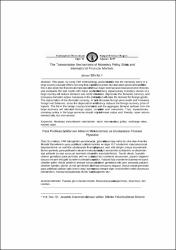The Transmission Mechanisms of Monetary Policy Shocks and International Financial Markets
Abstract
Bu makale, VAR tekniginden yararlanarak, gelismeis ekonomiye sahip bir ulke olan Amerika Birlesik Devletlerinin para politikasi soklarinin bu ulke ve diger G-7 ulkelerinin makroekonomik degiskenlerine ve ozellikle uluslararasi finansal piyasalara nasil etki ettigini ortaya koymaktadir. Bunun yaninda, para polikasinin aktarim mekanizmasi ve ilgili ana teoriler aciklanmis ve cikarimlari test edilerek bu test sonuclari teorilerin cikarimlari ile karsilastirilmistir. Teorik olarak, buyuk bir ulkenin genisletici para politikasi yerli ve uluslararasi faiz oranlarini dusururken, paranin degerini dusurur ve yerli mili gelir duzeyinin artmasina sebep olur. Yabanci faiz oranlarinin dusmesi ve buyuk ulkeden gelen ithalat talebinin artmasi sonucu ortaya cikan genisletici etki ayni zamanda yabanci ulkelerin tuketim, yatirim ve milli gelirlerinin de artmasi sonucunu dogurur. Sonuc olarak genisletici para politikasi sadece ilgili ulkenin degil ayni zamanda entegre diger ekonomilerin refah durumunu iyilestirirken, finansal piyasalarada olumlu katkilar saglamis olur. This paper, by using VAR methodology, presents evidence that the monetary policy of a large country causally affects not only that country's stock prices but also asset prices abroad. Besides this it also tests the theoretical implications of the four major international macroeconomic theories and compares the test results with these predictions. In theory expansionary monetary shocks of a large country will reduce domestic and world interest rates, depreciate the domestic currency, and increases domestic output. Increases in the domestic output will raise the demand for foreign goods. The depreciation of the domestic currency, in turn, will decrease foreign price levels and increases foreign real balances, since the depreciation of the currency reduces the foreign currency price of imports. The fall in the foreign country interest rates and the aggregate demand spillover from the large economy will stimulate foreign output, consumption and investment. Thus, expansionary monetary policy in the large economy should not only increase output and, thereby, asset returns domestically, but also abroad.
Source
Dumlupınar Üniversitesi Sosyal Bilimler DergisiVolume
0Issue
18URI
http://www.trdizin.gov.tr/publication/paper/detail/TmprM09ERXg=https://hdl.handle.net/11421/19123
Collections
- Makale Koleksiyonu [130]
- TR-Dizin İndeksli Yayınlar Koleksiyonu [3512]


















